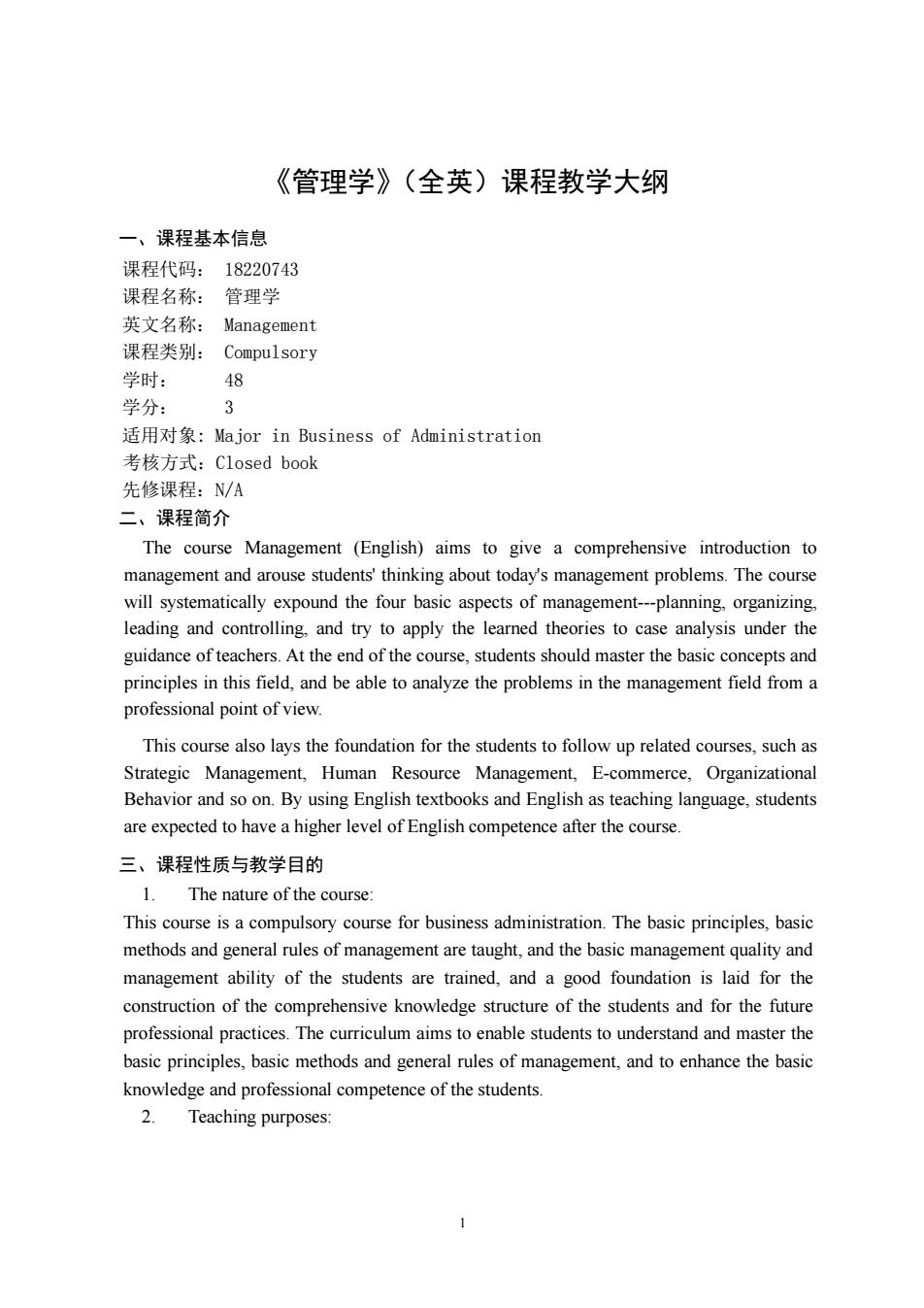
《管理学》(全英)课程教学大纲 一、课程基本信息 课程代码:18220743 课程名称: 管理学 英文名称:Management 课程类别: Compulsory 学时: 48 学分: 适用对象:Major in Business of Administration 考核方式:Closed book 先修课程:N/A 二、课程简介 The course Management (English)aims to give a comprehensive introduction to management and arouse students'thinking about today's management problems.The course will systematically expound the four basic aspects of management---planning.organizing. leading and controlling.and try to apply the learned theories to case analysis under the guidance of teachers.At the end of the course,students should master the basic concepts and principles in this field,and be able to analyze the problems in the management field from a professional point of view. This course also lays the foundation for the students to follow up related courses,such as Strategic Management,Human Resource Management,E-commerce,Organizational Behavior and so on.By using English textbooks and English as teaching language,students are expected to have a higher level of English competence after the course 三、课程性质与教学目的 1 The nature of the course: This course is a compulsory course for business administration.The basic principles,basic methods and general rules of management are taught,and the basic management quality and management ability of the students are trained.and a good foundation is laid for the construction of the comprehensive knowledge structure of the students and for the future professional practices.The curriculum aims to enable students to understand and master the basic principles,basic methods and general rules of management,and to enhance the basic knowledge and professional competence of the students. 2. Teaching purposes:
1 《管理学》(全英)课程教学大纲 一、课程基本信息 课程代码: 18220743 课程名称: 管理学 英文名称: Management 课程类别: Compulsory 学时: 48 学分: 3 适用对象: Major in Business of Administration 考核方式:Closed book 先修课程:N/A 二、课程简介 The course Management (English) aims to give a comprehensive introduction to management and arouse students' thinking about today's management problems. The course will systematically expound the four basic aspects of management---planning, organizing, leading and controlling, and try to apply the learned theories to case analysis under the guidance of teachers. At the end of the course, students should master the basic concepts and principles in this field, and be able to analyze the problems in the management field from a professional point of view. This course also lays the foundation for the students to follow up related courses, such as Strategic Management, Human Resource Management, E-commerce, Organizational Behavior and so on. By using English textbooks and English as teaching language, students are expected to have a higher level of English competence after the course. 三、课程性质与教学目的 1. The nature of the course: This course is a compulsory course for business administration. The basic principles, basic methods and general rules of management are taught, and the basic management quality and management ability of the students are trained, and a good foundation is laid for the construction of the comprehensive knowledge structure of the students and for the future professional practices. The curriculum aims to enable students to understand and master the basic principles, basic methods and general rules of management, and to enhance the basic knowledge and professional competence of the students. 2. Teaching purposes:
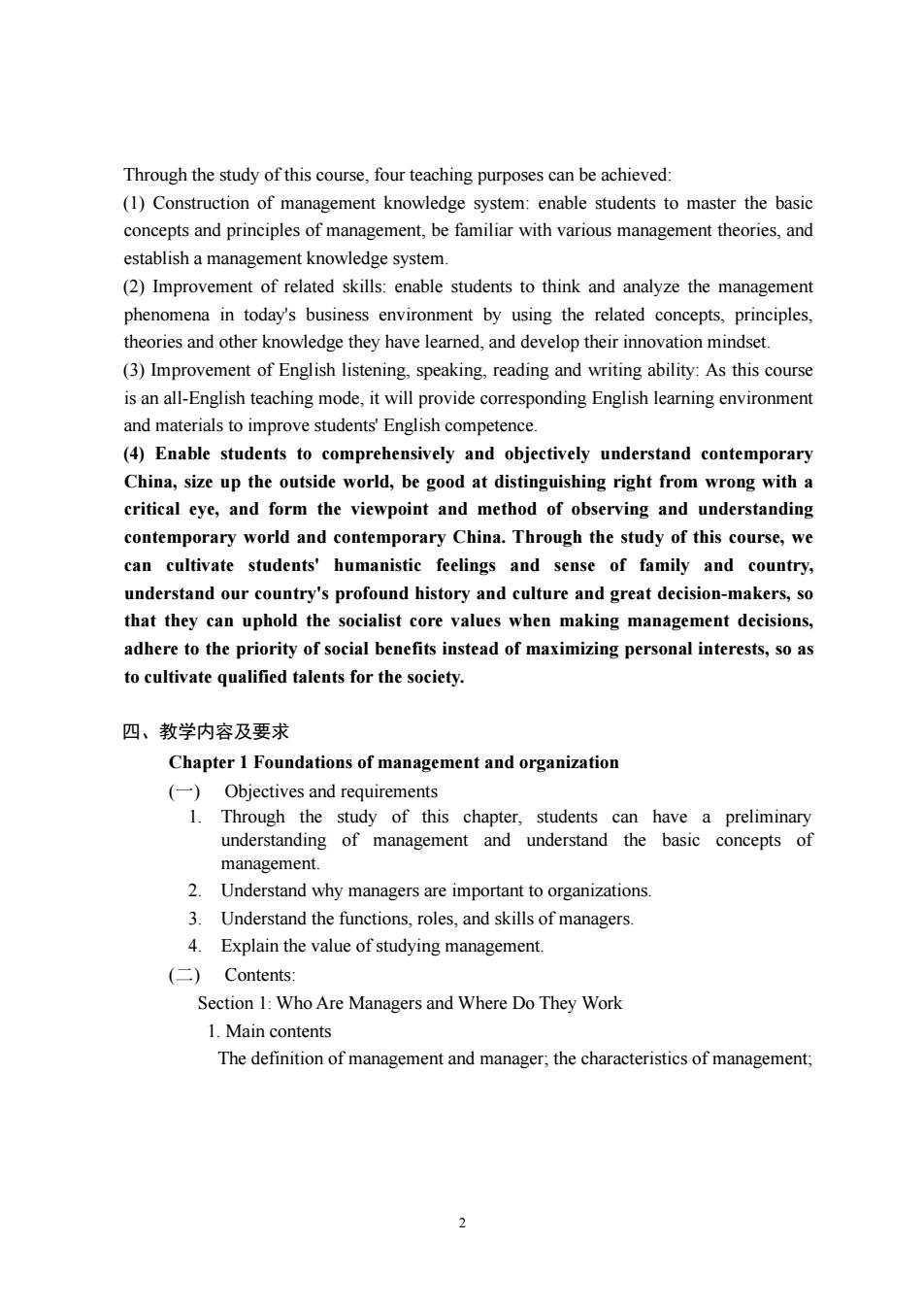
Through the study of this course.four teaching purposes can be achieved (1)Construction of management knowledge system:enable students to master the basic concepts and principles of management,be familiar with various management theories,and establish a management knowledge system (2)Improvement of related skills:enable students to think and analyze the management phenomena in today's business environment by using the related concepts,principles. theories and other knowledge they have learned,and develop their innovation mindset. (3)Improvement of English listening,speaking,reading and writing ability:As this course is an all-English teaching mode,it will provide corresponding English learning environment and materials to improve students'English competence. (4)Enable students to comprehensively and objectively understand contemporary China,size up the outside world,be good at distinguishing right from wrong with a critical eye,and form the viewpoint and method of observing and understanding contemporary world and contemporary China.Through the study of this course,we can cultivate students'humanistic feelings and sense of family and country, understand our country's profound history and culture and great decision-makers,so that they can uphold the socialist core values when making management decisions, adhere to the priority of social benefits instead of maximizing personal interests,so as to cultivate qualified talents for the society. 四、教学内容及要求 Chapter 1 Foundations of management and organization (-)Objectives and requirements 1 udy of this chapter.students basic concepts o management. 2.Understand why managers are important to organizations 3. Understand the functions,roles,and skills of managers. 4.Explain the value of studying management. (仁)Contents: Section 1:Who Are Managers and Where Do They Work 1.Main contents The definition of management and manager,the characteristics of management
2 Through the study of this course, four teaching purposes can be achieved: (1) Construction of management knowledge system: enable students to master the basic concepts and principles of management, be familiar with various management theories, and establish a management knowledge system. (2) Improvement of related skills: enable students to think and analyze the management phenomena in today's business environment by using the related concepts, principles, theories and other knowledge they have learned, and develop their innovation mindset. (3) Improvement of English listening, speaking, reading and writing ability: As this course is an all-English teaching mode, it will provide corresponding English learning environment and materials to improve students' English competence. (4) Enable students to comprehensively and objectively understand contemporary China, size up the outside world, be good at distinguishing right from wrong with a critical eye, and form the viewpoint and method of observing and understanding contemporary world and contemporary China. Through the study of this course, we can cultivate students' humanistic feelings and sense of family and country, understand our country's profound history and culture and great decision-makers, so that they can uphold the socialist core values when making management decisions, adhere to the priority of social benefits instead of maximizing personal interests, so as to cultivate qualified talents for the society. 四、教学内容及要求 Chapter 1 Foundations of management and organization (一) Objectives and requirements 1. Through the study of this chapter, students can have a preliminary understanding of management and understand the basic concepts of management. 2. Understand why managers are important to organizations. 3. Understand the functions, roles, and skills of managers. 4. Explain the value of studying management. (二) Contents: Section 1: Who Are Managers and Where Do They Work 1. Main contents The definition of management and manager; the characteristics of management;
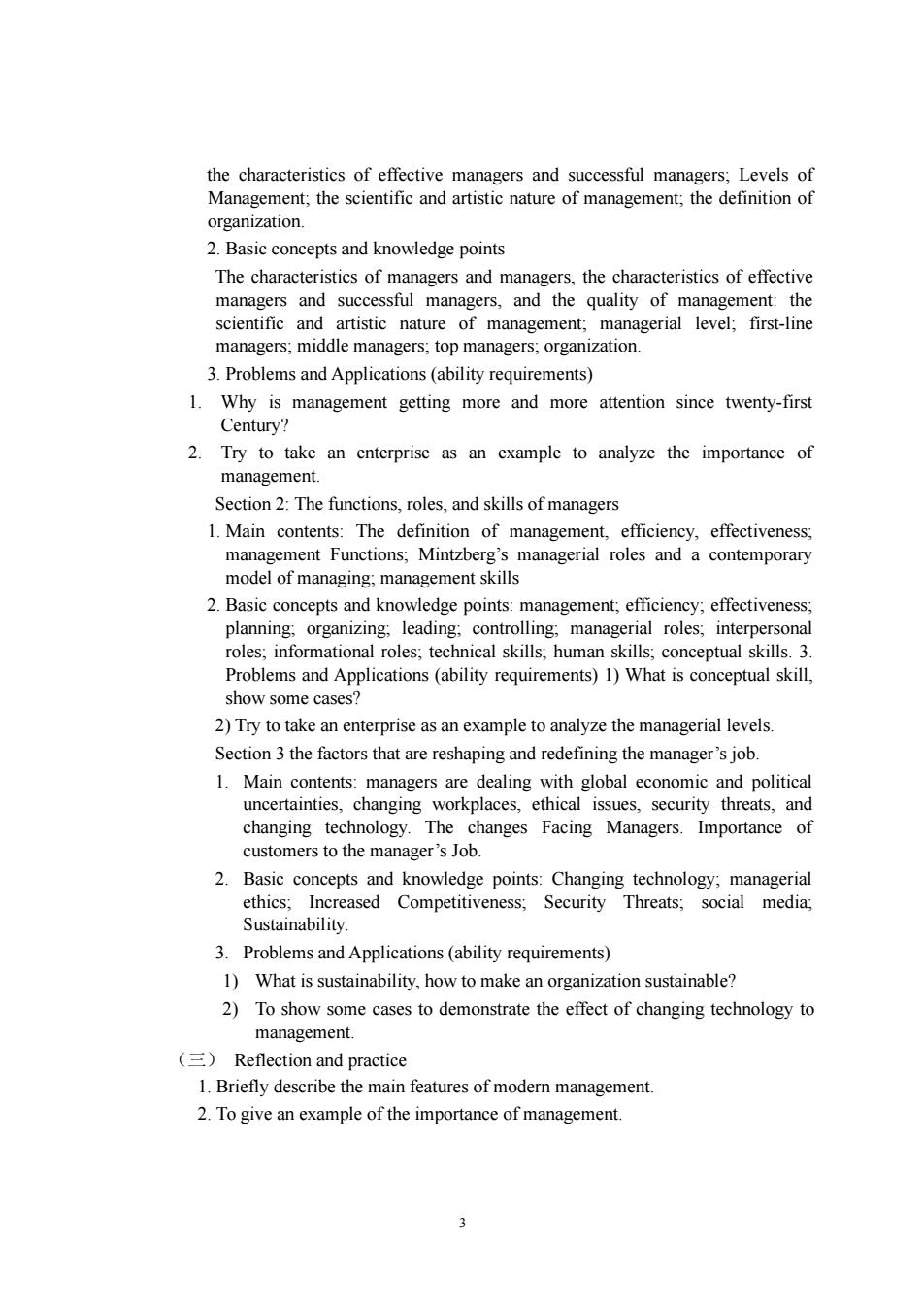
the characteristics of effective managers and successful managers:Levels of Management;the scientific and artistic nature of management,the definition of organization. 2.Basic concepts and knowledge points The characteristics of managers and managers,the characteristics of effective managers and successful managers,and the quality of management:the scientific and artistic nature of management;managerial level;first-line managers:middle managers;top managers;organization. 3.Problems and Applications(ability requirements) 1.Why is management getting more and more attention since twenty-first 2.Try to take an enterprise as an example to analyze the importance of management. Section2:The functions,roles,and skills of managers 1.Main contents:The definition of management,efficiency,effectiveness; management Functions;Mintzberg's managerial roles and a contemporary model of managing:management skills 2.Basic points: cy.effectiveness ing:managerial roles,interpersona roles;informational roles;technical skills,human skills,conceptual skills.3 Problems and Applications(ability requirements)1)What is conceptual skill, show some cases? 2)Try to take an enterprise as an example to analyze the managerial levels Section 3 the factors that are reshaping and redefining the manager's job. 1.Main tie ging threats,an s Facing Managers. Importance of customers to the manager's Job 2.Basic concepts and knowledge points:Changing technology;managerial ethics:Increased Competitiveness,Security Threats: social media Sustainability 3.Problems and Applications(ability requirements) 1)What is sustainability,how to make an organization sustainable? 2)To show some cases to demonstrate the effect of changing technology to manasement ()Reflection and practice 1.Briefly describe the main features of modern management 2.To give an example of the importance of management
3 the characteristics of effective managers and successful managers; Levels of Management; the scientific and artistic nature of management; the definition of organization. 2. Basic concepts and knowledge points The characteristics of managers and managers, the characteristics of effective managers and successful managers, and the quality of management: the scientific and artistic nature of management; managerial level; first-line managers; middle managers; top managers; organization. 3. Problems and Applications (ability requirements) 1. Why is management getting more and more attention since twenty-first Century? 2. Try to take an enterprise as an example to analyze the importance of management. Section 2: The functions, roles, and skills of managers 1. Main contents: The definition of management, efficiency, effectiveness; management Functions; Mintzberg’s managerial roles and a contemporary model of managing; management skills 2. Basic concepts and knowledge points: management; efficiency; effectiveness; planning; organizing; leading; controlling; managerial roles; interpersonal roles; informational roles; technical skills; human skills; conceptual skills. 3. Problems and Applications (ability requirements) 1) What is conceptual skill, show some cases? 2) Try to take an enterprise as an example to analyze the managerial levels. Section 3 the factors that are reshaping and redefining the manager’s job. 1. Main contents: managers are dealing with global economic and political uncertainties, changing workplaces, ethical issues, security threats, and changing technology. The changes Facing Managers. Importance of customers to the manager’s Job. 2. Basic concepts and knowledge points: Changing technology; managerial ethics; Increased Competitiveness; Security Threats; social media; Sustainability. 3. Problems and Applications (ability requirements) 1) What is sustainability, how to make an organization sustainable? 2) To show some cases to demonstrate the effect of changing technology to management. (三) Reflection and practice 1. Briefly describe the main features of modern management. 2. To give an example of the importance of management
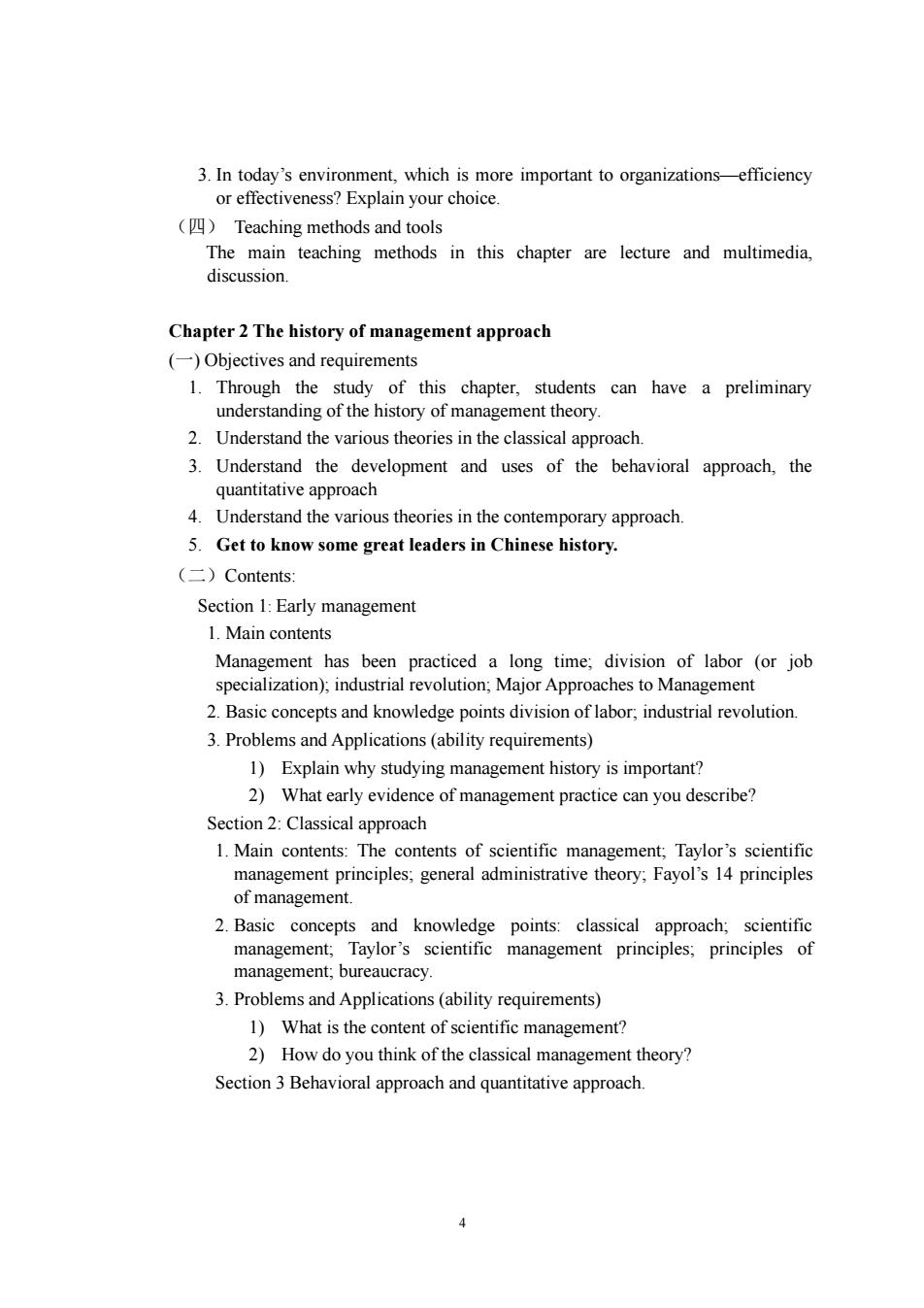
3.In today's environment,which is more important to organizationsefficiency or effectiveness?Explain your choice. (Teaching methods and tools The main teaching methods in this chapter are lecture and multimedia, discussion. Chapter 2 The history of management approach ()Objectives and requirements 1.Through the study of this chapter,students can have a preliminary understanding of the history of management theory. 2.Understand the various theories in the classical approach 3.Understand the development and uses of the behavioral approach,the quantitative approach 4.Understand the various theories in the contemporary approach 5.Get to know some great leaders in Chinese history. (二)Contents Section 1:Early management 1.Main contents prac d a long time,divisior n of labor (or job ization):industrial revolution;Major Approaches to Management 2.Basic concepts and knowledge points division of labor,industrial revolution. 3.Problems and Applications(ability requirements) 1)Explain why studying management history is important? 2)What early evidence of management practice can you describe? Section 2:Classical approach 1.Main contents:The contents of scientific management:Taylor's scientific management principles;general administrative theory;Fayol's 14 principles of management. 2.Basic concepts and knowledge points:classical app oroach scientific managemen Taylor's scientific management principles;principles of management,bureaucracy. 3.Problems and Applications(ability requirements) 1)What is the content of scientific management? 2)How do you think of the classical management theory? Section3 Behavioral approach and quantitative approach
4 3. In today’s environment, which is more important to organizations—efficiency or effectiveness? Explain your choice. (四) Teaching methods and tools The main teaching methods in this chapter are lecture and multimedia, discussion. Chapter 2 The history of management approach (一) Objectives and requirements 1. Through the study of this chapter, students can have a preliminary understanding of the history of management theory. 2. Understand the various theories in the classical approach. 3. Understand the development and uses of the behavioral approach, the quantitative approach 4. Understand the various theories in the contemporary approach. 5. Get to know some great leaders in Chinese history. (二)Contents: Section 1: Early management 1. Main contents Management has been practiced a long time; division of labor (or job specialization); industrial revolution; Major Approaches to Management 2. Basic concepts and knowledge points division of labor; industrial revolution. 3. Problems and Applications (ability requirements) 1) Explain why studying management history is important? 2) What early evidence of management practice can you describe? Section 2: Classical approach 1. Main contents: The contents of scientific management; Taylor’s scientific management principles; general administrative theory; Fayol’s 14 principles of management. 2. Basic concepts and knowledge points: classical approach; scientific management; Taylor’s scientific management principles; principles of management; bureaucracy. 3. Problems and Applications (ability requirements) 1) What is the content of scientific management? 2) How do you think of the classical management theory? Section 3 Behavioral approach and quantitative approach
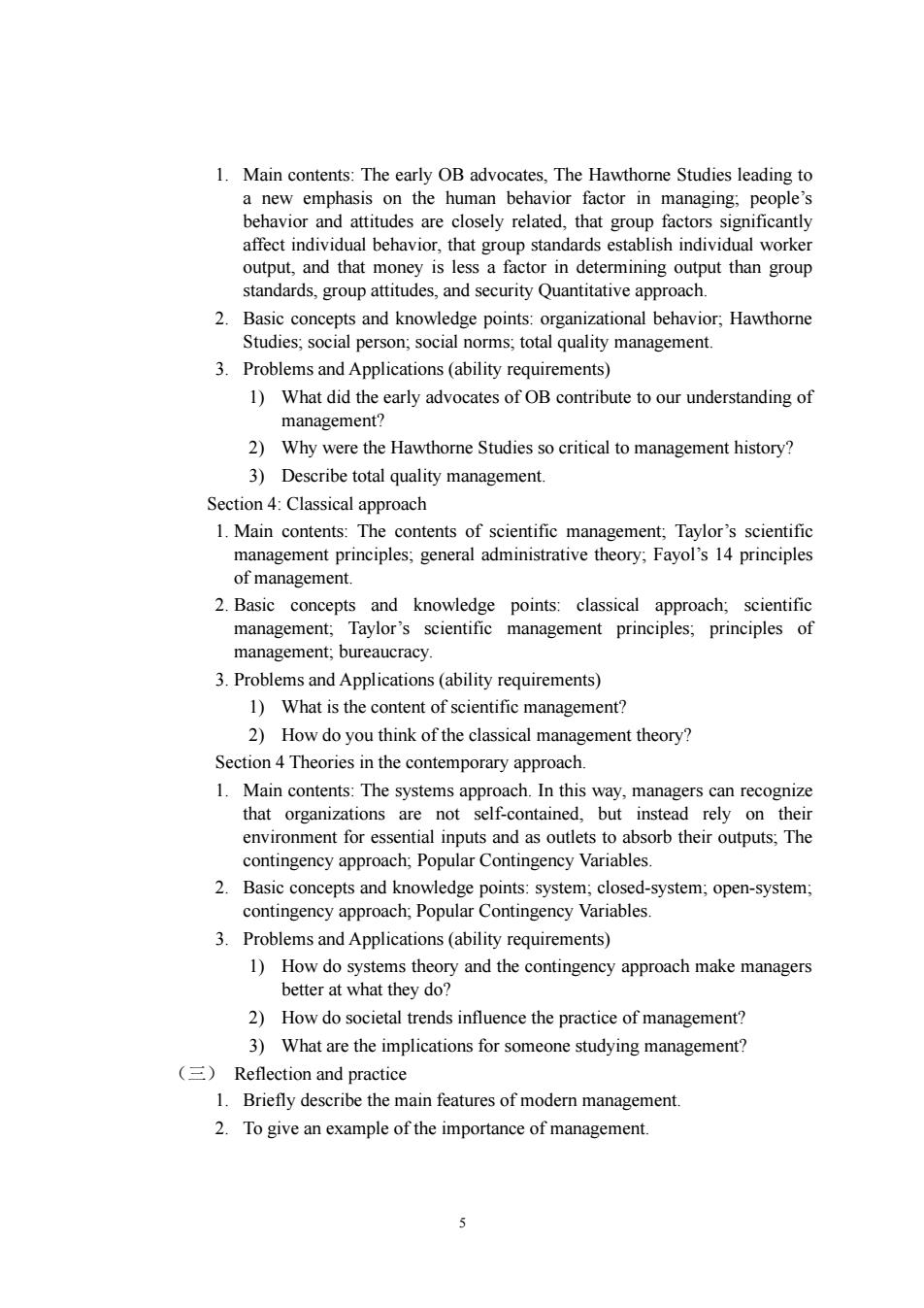
1.Main contents:The early OB advocates.The Hawthorne Studies leading to a new emphasis on the human behavior factor in managing:people's behavior and attitudes are closely related,that group factors significantly affect individual behavior,that group standards establish individual worker output,and that money is less a factor in determining output than group standards,group attitudes,and security Quantitative approach. 2.Basic concepts and knowledge points:organizational behavior,Hawthorne Studies;social person;social norms,total quality management. 3.Problems and Applications(ability requirements) 1)What did the early advocates of OB contribute to our understanding of management? 2)Why were the Hawthorne Studies so critical to management history? 3)Describe total quality management. Section:Classical approach 1.Main contents:The contents of scientific management:Taylor's scientific management principles:general administrative theory;Fayol's 14 principles of management. 2.Basic concepts and knowledge e points: classical approach:scientific managemen Taylor's scientific management principles,principles of management:bureaucracy. 3.Problems and Applications(ability requirements) 1)What is the content of scientific management? 2)How do you think of the classical management theory? Section 4 Theories in the contemporary approach. 1.Main contents:The systems approach.In this way,managers can recognize that orga nizations not self-contained,but instead rely on their ment fore tial pu】 as out connene apprch Popur onn Variabl orb the outputs:The 2.Basic concepts and knowledge points:system;closed-system;open-system; contingency approach;Popular Contingency Variables 3.Problems and Applications(ability requirements) 1)How do systems theory and the contingency approach make managers better at what they do? 2)How do societal trends influence the practice of management? 3)What are the implications for someone studying management? (Reflection and practice 1 Briefly describe the main features of modern management 2.To give an example of the importance of management
5 1. Main contents: The early OB advocates, The Hawthorne Studies leading to a new emphasis on the human behavior factor in managing; people’s behavior and attitudes are closely related, that group factors significantly affect individual behavior, that group standards establish individual worker output, and that money is less a factor in determining output than group standards, group attitudes, and security Quantitative approach. 2. Basic concepts and knowledge points: organizational behavior; Hawthorne Studies; social person; social norms; total quality management. 3. Problems and Applications (ability requirements) 1) What did the early advocates of OB contribute to our understanding of management? 2) Why were the Hawthorne Studies so critical to management history? 3) Describe total quality management. Section 4: Classical approach 1. Main contents: The contents of scientific management; Taylor’s scientific management principles; general administrative theory; Fayol’s 14 principles of management. 2. Basic concepts and knowledge points: classical approach; scientific management; Taylor’s scientific management principles; principles of management; bureaucracy. 3. Problems and Applications (ability requirements) 1) What is the content of scientific management? 2) How do you think of the classical management theory? Section 4 Theories in the contemporary approach. 1. Main contents: The systems approach. In this way, managers can recognize that organizations are not self-contained, but instead rely on their environment for essential inputs and as outlets to absorb their outputs; The contingency approach; Popular Contingency Variables. 2. Basic concepts and knowledge points: system; closed-system; open-system; contingency approach; Popular Contingency Variables. 3. Problems and Applications (ability requirements) 1) How do systems theory and the contingency approach make managers better at what they do? 2) How do societal trends influence the practice of management? 3) What are the implications for someone studying management? (三) Reflection and practice 1. Briefly describe the main features of modern management. 2. To give an example of the importance of management